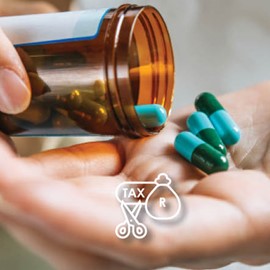
If you have relatively high medical expenses that were not paid by a medical scheme, or you are over the age of 65 or you, your spouse (or life partner) or child suffer from a disability or a physical impairment, you may also qualify for an additional tax credit.
For further information on the additional credit for taxpayers paying expenses related to a disability, read: What is the additional medical tax credit for disability expenses?
For under 65s
|
What is a qualifying medical expense If you want to claim medical expenses you did not recover from a medical scheme, they must meet the following qualifying criteria. They must be for:
|
When you submit your tax return, you should record ![]() your unrecouped medical expenses. The South African Revenue Service (SARS) will determine if these expenses qualify for what it refers to as the additional medical tax credit.
your unrecouped medical expenses. The South African Revenue Service (SARS) will determine if these expenses qualify for what it refers to as the additional medical tax credit.
If you submit all your medical expenses to your medical scheme, the scheme will record them on your tax certificate, giving you an easy total to enter on your tax return.
If you do not submit your expenses to your scheme – for example, when you know you have exhausted your medical savings account, or a benefit limit has been exceeded – you need to keep your own record of these expenses. It is a good idea therefore to submit all your expenses, even you know the scheme will not pay, so that they are recorded on the tax certificate the scheme issues.
The expenses you record for the purposes of the tax credit can only be what are known as qualifying medical expenses (see Explainer).
In order to qualify for the additional medical tax credit, your medical expenses plus any contributions you have paid above a certain amount need to exceed a threshold.
That threshold, if you are under the age of 65, is 7.5% of your income.
The contributions that count for this credit are those that exceed four times the rand amount allowed for the medical scheme fees tax credit.
Click here if you want to know how to calculate the additional medical tax credit for yourself.
For over 65s
Any taxpayer who is over the age of 65, or who turns 65 within a tax year, can deduct from their tax a greater portion of their medical scheme contributions and their unrecouped medical expenses than younger taxpayers (see Explainer for the expenses that qualify).
![]() The amount you can deduct is one third of your unrecouped medical expenses and one third of your medical scheme contributions that exceed three times the medical fees tax credit. These expenses do not have to exceed the 7.5% of income threshold as is the case for younger members.
The amount you can deduct is one third of your unrecouped medical expenses and one third of your medical scheme contributions that exceed three times the medical fees tax credit. These expenses do not have to exceed the 7.5% of income threshold as is the case for younger members.
If you are still working at age 65 or beyond, your employer should calculate whether you are entitled to an additional medical tax credit for your contributions and factor this in when calculating your PAYE. If you are receiving an annuity or pension, you can ask your provider to take your contributions into account when calculating your PAYE.
|
TAX TIP If a medical practitioner charges you R1 100 for a consultation but your scheme only pays R700, the R400 you did not recoup will qualify as an unrecouped medical expense.
|
If you are self-employed, earning business income or an independent consultant, the additional medical tax credit you are entitled to should be calculated for you when you fill in your income tax return. You must, however, calculate for yourself when you file your provisional tax return.
If you have unrecouped medical expenses, you can only claim these when you submit your tax return.
SARS will calculate the credit you are entitled to. If you want to know how to calculate it yourself, click here.
Remember to only enter the unrecouped expenses next to the code 4546 and your contributions next to the code 4005 on your tax return.
If you are paying contributions for a family member registered on another scheme – for example, a parent – and your employer has not included this on your IRP5, you should record these contributions on the tax return next to the code 4040.
